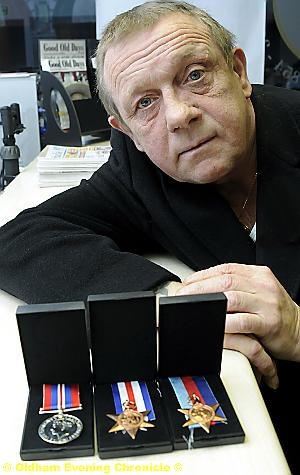Ernie to receive his father’s WWII medals
Reporter: Helen Korn
Date published: 22 November 2011

Ernie Townsend with his father’s war medals
THE proud family of a Derker man who guarded war criminals during the Nuremberg trials are to be presented with his war medals — over 60 years late.
Private Ernest Townsend, of Stoneleigh Street, was the only Briton to be picked from his regiment — the American 18th infantry — to guard a Nazi war criminal during the military tribunals, which were held by the victorious Allied forces after the Second World War.
It has taken his son, Ernie Townsend, with the help of his partner Suzi Banks, 12 months to piece together Ernest’s part in the war and its aftermath and rightfully claim his medals from the Ministry of Defence.
Their search started when the couple found an old photograph of Ernest, whi died in 1986, in a tank and decided to research more online.
The Royal British Legion has decided to present Ernie and his nine brothers and sisters with three medals — the 1939-45 medal, the France and Germany star and the 1939-45 star, at a special ceremony in Chadderton Town Hall tomorrow.
Vivienne Hardacre, who works at Chadderton Town Hall as a registrar, first heard about the case when Miss Banks came in to collect a death certificate.
Her husband, Maj Eddie Hardacre, and Royal British Legion chairman Trevor Warren, arranged the service and will present Ernest’s medals to his family.
Pte Townsend joined the army in 1943 and served as personal trainer in the Pioneer Corps before landing a job with the military police with the 18th infantry regiment, known as the “big red one”.
In July, 1944, he received a medal for helping to construct a fuel pipeline in Normandy over 180 days and went on to be selected to take part in the Nuremberg trials.
Ernie said: “My dad never told me about the trials because you had to be in the special forces to get into the prison. It was top secret.
“He was supposed to be honoured with the medals at a service, but he couldn’t attend — he was so stressed out by all the horrific images he had seen that he couldn’t face it. He only had 21 days’ leave and then he had to go back for another trial.
“He was quite good at lots of things so they used him a bit like a freelancer, but he hadn’t expected to go to Nuremberg.”
In September, 1946, Ernest told a military observer that most of the charges in the cases had been for ill-treatment of British prisoners of war.
Part of his job was to check ID cards of civilians who went to watch the trials — as the public gallery was usually full of relatives of the accused. Among those facing trial were Hermann Göring, commander of the Luftwaffe, and some of Hitler’s henchmen.
Mr Warren said receiving the medals was fantastic news for the family and a real achievement for Oldham.
“These days families sell medals, but I think things like this should be kept in the family. That’s what we’re all about at the British Legion.
“It can be daunting for families to find their relatives’ medals and it is brilliant news because these trials were a massive part of history.
“There were only a few English people involved so it’s great that a man from Oldham was there.”
Ernie added: “I didn’t think it was important but in this last 18 months I started taking it seriously. People used to come up to me and say, ‘You know your dad was in the Nuremberg trials, that’s something to be proud of’, but I never bothered.
“Now I think it’s fantastic and I wish he’d told me a lot more because now I’m really interested. I’m desperately trying to find out which criminal he guarded in cell 28.”
“We’re going to put the medals in the Imperial War Museum at Salford Quays in dedication to all the soldiers past and present and their families.”
Ernest frequently played piano around Oldham pubs, but especially the Help the Poor Struggler, in Failsworth alongside Albert Pierrepoint, Britain’s most prolific hangman.
Ernest was also known for walking down Union Street on his hands and also winning the Mr Oldham competition in the 1950s, for his physique.
Most Viewed News Stories
- 1The Oldhamers handed awards in King’s New Year’s Honours List
- 2You can score free tickets to a Latics game while supporting Dr Kershaw’s Hospice
- 3Public inquiry announced into rail upgrade that could leave villages ‘cut off’ for months
- 4Primary school in Uppermill considers introducing new ‘faith-based’ entry criteria to tackle...
- 5Tributes paid following death of hugely respected Oldham community figure Dale Harris




